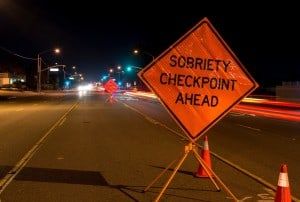 There’s a roadblock ahead. A barrier has been set up, with police cars parked close by. A line of cars snakes up to the barrier.
There’s a roadblock ahead. A barrier has been set up, with police cars parked close by. A line of cars snakes up to the barrier.
You’ve heard of DUI checkpoints, but you’ve never been stopped at one. What do you do?
Some people are frightened of sobriety checkpoints, even if they haven’t had a drop to drink. Others object to them as an invasion of privacy. But whatever your reaction, checkpoints are used in many states, including North Carolina, as a means of finding impaired drivers. So it helps to know how to deal with them. Here are four things you should not do when you see the lights and signs ahead:
- Turn to avoid the checkpoint. The North Carolina Supreme Court ruled that allowing drivers to turn away at the last minute defeats the purpose of the checkpoint. If you do it, prepare to be stopped.
- Object to the checkpoint on legal grounds. Sobriety checkpoints are legal. There are strict guidelines governing how checkpoints are conducted so that they satisfy 4th Amendment concerns. There must be a written guideline stating the pattern used for choosing which cars to stop (police can’t just decide whom to target). You’re allowed to voice your objections, of course, but the legality is established.
- Refuse the breathalyzer test. You might be allowed legally to refuse the test, but unless you are seriously worried about incriminating yourself, you’ll be asked to do other sobriety tests, and could be brought to the station.
- Ask to wait for an attorney. You have the right to do so, but doing so will be interpreted as a tactic to stall for time until your blood alcohol concentration (BAC) goes down.
Sobriety Checkpoints Made Easy
The list of things to do at a sobriety checkpoint is much shorter: stop, answer questions, and if required, take the test. In no time at all you’ll be on your way, because, like smart drivers everywhere, you never drink and drive.
